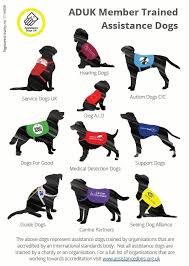Training Your Own Autism Service Dog
For individuals with autism, service dogs can provide invaluable support and companionship. While there are organisations that train and provide service dogs for individuals with autism, some people may choose to train their own service dog. Here are some important considerations and steps to keep in mind when training your own autism service dog:
Assessing Suitability
Not all dogs are suitable for service work. It’s important to choose a dog with the right temperament, intelligence, and willingness to learn. Consider working with a professional trainer or behaviourist to assess potential candidates for your service dog.
Basic Obedience Training
Before starting specific tasks related to autism support, your dog should have a solid foundation in basic obedience training. This includes commands such as sit, stay, come, and heel.
Specialised Tasks
Depending on your individual needs, you can train your service dog to perform tasks that help mitigate the challenges associated with autism. This may include providing deep pressure therapy during times of stress or anxiety, interrupting repetitive behaviours, or alerting to sensory overload.
Socialisation and Public Access Training
Your service dog should be well-socialised and comfortable in various environments. Public access training is essential to ensure that your dog behaves appropriately in public spaces and is not disruptive or fearful.
Legal Considerations
It’s important to be aware of the laws and regulations regarding service dogs in your area. In many countries, including the UK, service dogs are granted certain rights of access to public places under disability discrimination laws.
Maintaining Training
Training a service dog is an ongoing process that requires consistency and dedication. Regular practice sessions and reinforcement of learned behaviours are essential for maintaining the skills of your autism service dog.
Training your own autism service dog can be a rewarding experience that strengthens the bond between you and your canine companion. Remember to seek guidance from professionals in the field of assistance dog training to ensure that you are following best practices and providing the best possible support for yourself or your loved one with autism.
Five Essential Tips for Successfully Training Your Autism Service Dog
- Consistency is key in training your autism service dog. Stick to a routine to help your dog understand what is expected.
- Use positive reinforcement such as treats and praise to reward good behaviour during training sessions.
- Start training early and be patient with your dog. It takes time for them to learn new commands and behaviours.
- Socialize your autism service dog regularly with different people, animals, and environments to help them become well-adjusted companions.
- Seek guidance from professional trainers or organisations experienced in training service dogs for individuals with autism.
Consistency is key in training your autism service dog. Stick to a routine to help your dog understand what is expected.
Consistency is paramount when it comes to training your own autism service dog. By maintaining a regular routine and sticking to clear expectations, you provide your dog with a sense of structure and predictability. This consistency helps your dog understand what is required of them and reinforces desired behaviours over time. Establishing and following a consistent training schedule not only aids in the learning process but also strengthens the bond between you and your service dog, fostering trust and communication essential for effective assistance.
Use positive reinforcement such as treats and praise to reward good behaviour during training sessions.
When training your own autism service dog, it is crucial to utilise positive reinforcement techniques, such as offering treats and praise, to reward good behaviour during training sessions. By using rewards that your dog finds motivating and enjoyable, you can encourage the desired behaviours and strengthen the bond between you and your canine companion. Positive reinforcement not only makes the training process more effective but also creates a positive and supportive learning environment for your service dog.
Start training early and be patient with your dog. It takes time for them to learn new commands and behaviours.
Starting training early and practising patience are key aspects of successfully training your own autism service dog. Dogs, like humans, require time to understand and master new commands and behaviours. By initiating training early on and maintaining a patient and consistent approach, you can help your dog develop the skills necessary to provide valuable support for individuals with autism. Remember that progress may be gradual, but with dedication and understanding, you can build a strong foundation for a fulfilling partnership with your service dog.
Socialize your autism service dog regularly with different people, animals, and environments to help them become well-adjusted companions.
Socialising your autism service dog regularly with a variety of people, animals, and environments is crucial for their development into a well-adjusted companion. Exposure to different social situations helps them build confidence, adaptability, and good behaviour in various settings. By introducing your service dog to diverse experiences early on and reinforcing positive interactions, you are laying the foundation for them to navigate the world with ease and comfort as they support you in managing the challenges of autism.
Seek guidance from professional trainers or organisations experienced in training service dogs for individuals with autism.
When training your own autism service dog, it is crucial to seek guidance from professional trainers or organisations experienced in training service dogs for individuals with autism. These experts can provide valuable insights, specialised knowledge, and proven techniques to help you effectively train your service dog to meet the specific needs of autism support. By tapping into their expertise, you can ensure that your training approach is tailored to maximise the benefits and capabilities of your canine companion in assisting with autism-related tasks and challenges.

